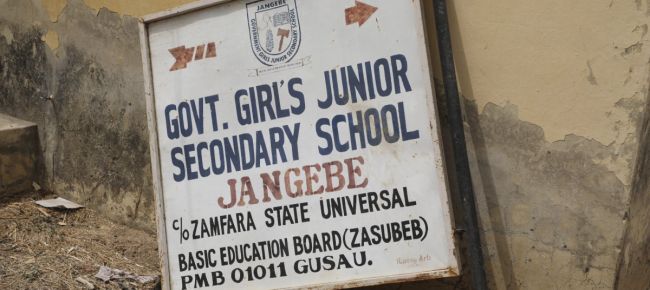Nigeria: students and schools must be protected from attacks
On Friday 26 February, a large group of unidentified gunmen raided the Government Girl’s Secondary School of Jangebe town in the Zamfara State in a night attack. They abducted 279 girls from the boarding school and took them to the forest. All girls were eventually released on Tuesday night after four days of fear and terror.
Education International had immediately condemned the attack and called for the immediate release of the schoolgirls kidnapped in Jangebe and all children currently in the hands of armed groups in Nigeria.
“All children have the right to education in a safe environment free of violence and harassment. We must especially defend the right of girls to a quality education at every stage”, stated David Edwards, General Secretary of Education International. He added, “The Nigerian government must act immediately to prevent such attacks on schools, to protect the lives of children and to ensure their right to education.”
Kidnapping is a too common issue in the north of Nigeria where extremist groups and criminal gangs resort to abduction in the hope of extracting ransom. The payment of such ransom is controversial in the country and authorities have repeatedly said that they don’t negotiate with armed groups. The armed groups are more and more targeting schoolchildren and teachers.
The Jangebe attack was the third in a series of mass kidnappings targeting students and schoolchildren in Northern Nigeria in the last few months. In December, 344 boys were taken from their boarding school in the town of Kankara, in Katsina State and were released after 6 days. Another attack against a boarding school in Kagara occurred on 17 February, resulting in the death of a student and the abduction of 27 students, 3 teachers and 12 family members of the school personnel. All were freed 10 days later on 27 February.
UN Secretary-General António Guterres strongly condemned the recent attacks and reiterated that “attacks on schools and other educational facilities constitute a grave violation of the rights of children and human rights more broadly.” He further stressed that “schools must remain safe spaces for children to learn without fear of violence.”
These attacks are a painful reminder to the international community that 7 years after the notorious abduction of 276 girls by the Islamist group Boko Haram in the town of Chibok in Borno State, it’s still not safe for students and schoolchildren to simply go to school in Northern Nigeria. In 2014, the events in Chibok sparked global outrage. While some of the girls were released following a global online campaign #BringBackOurGirls, more than 100 are still missing today.
Devastating impact on the right to education
Beyond the direct risk of violence and exploitation faced by abducted children and teachers, such attacks on schools have a devastating impact on the right to education of children, especially of girls. Many children have not returned to class in fear of new attacks and some schools have closed.
UN experts recently stressed that even after their release, victims are “at [an] increased risk of exploitation, trafficking, sexual and gender-based violence and other forms of violence.” Those children often lack the necessary support from the authorities to overcome the trauma and recover their physical and mental well-being.
Last week, the Education International's Africa Regional Committee passed a resolution condemning the abductions and calling on the Nigerian Government to take immediate action to prevent attacks on schools and other education institutions.
Education International's Regional Director for Africa, Dennis Sinyolo, has called on the Nigerian Government to break the unending cycle of abductions and protect students and educators from attack: “Education authorities across the continent should ensure teaching and learning environments that are supportive, comfortable, safe, and secure for all. This is a fundamental prerequisite if we want to achieve quality education and protect children’s right to education.”

[Fri, 05 Mar 2021 12:11:00 +0000] | DIGG THIS
Education International · No. 3 Torshie Close, · Mempeasem · East Legon Extension · Accra · Ghana
Phone: +233.302.50.12.00 · Fax: +233.302.50.66.81 · Email: eirafoffice@ei-ie.org
Website Development and Design by Cyblance
